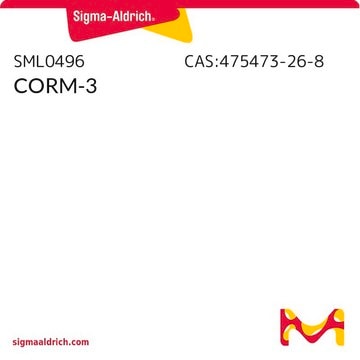SML0315
CORM-A1
≥95% (NMR)
Sinónimos:
Sodium boranocarbonate
About This Item
Productos recomendados
Quality Level
assay
≥95% (NMR)
form
powder
storage condition
desiccated
color
white to beige
solubility
H2O: >15 mg/mL
storage temp.
room temp
SMILES string
[Na+].[Na+].[BH3-]C([O-])=O
InChI
1S/CH4BO2.2Na/c2-1(3)4;;/h2H3,(H,3,4);;/q-1;2*+1/p-1
InChI key
SOFPSQNQOQPAAJ-UHFFFAOYSA-M
Application
- to deliver carbon monoxide (CO) and to test its cytoprotection in yeast and primary astrocytes culture during oxidative stress
- as CO donor in murine macrophages J774A.1 cells to test its effect on cellular β-endorphins elevation
- to test its effect on mitophagy activation in retinal ganglion cells
Biochem/physiol Actions
Storage Class
11 - Combustible Solids
wgk_germany
WGK 3
flash_point_f
Not applicable
flash_point_c
Not applicable
Certificados de análisis (COA)
Busque Certificados de análisis (COA) introduciendo el número de lote del producto. Los números de lote se encuentran en la etiqueta del producto después de las palabras «Lot» o «Batch»
¿Ya tiene este producto?
Encuentre la documentación para los productos que ha comprado recientemente en la Biblioteca de documentos.
Los clientes también vieron
Nuestro equipo de científicos tiene experiencia en todas las áreas de investigación: Ciencias de la vida, Ciencia de los materiales, Síntesis química, Cromatografía, Analítica y muchas otras.
Póngase en contacto con el Servicio técnico















